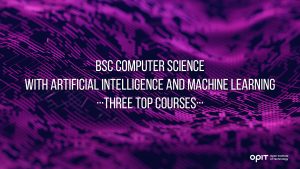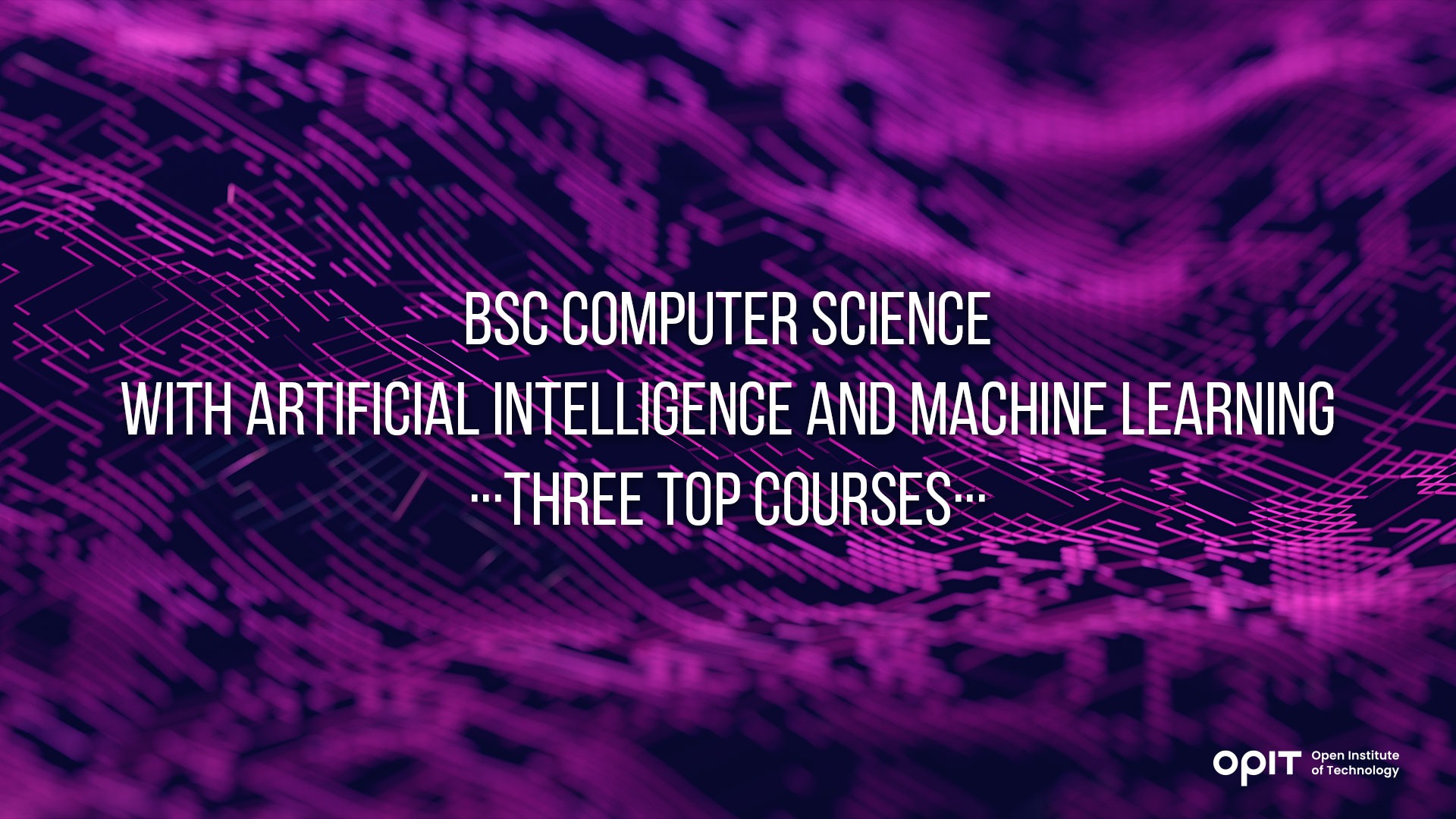Top Three Courses in BSc Computer Science With Artificial Intelligence and Machine Learning


AI is already a massive industry – valued at $136.55 billion (approx. €124.82 billion) as of 2022 – and it’s only going to get bigger as we come to grips with what AI can do. As a student, you stand on the cusp of the AI tidal wave and you have an opportunity to ride that wave into a decades-long career.
But you need a starting point for that career – a BSc computer science with artificial intelligence. The three courses discussed in this article are the best for budding AI masters.
Factors to Consider When Choosing a BSc Computer Science With AI Program
Before choosing your BSc, you need to know what to look for in a good course:
- Institution Accreditation – Whoever provides the course should offer solid accreditation so that you know you can trust the institution and that potential future employers actually respect the qualification you have on your VC.
- An AI-Focused Curriculum – Not all computer science bachelor’s degrees are the same. The one you choose needs to offer a specific focus on AI or machine learning so you can build the foundations for later specialization.
- Faculty Expertise – A course led by instructors who don’t know much about AI is like the blind leading the blind. Every mentor, instructor, and lecturer needs to have provable knowledge and industry experience.
- Job Opportunities – Every chance you have to “get your hands dirty” with AI is going to look great on your CV. Look for courses that create pathways into internships and job programs. Associations with organizations like IBM are a great place to start.
- Financial Aid – It isn’t cheap to study a BSc artificial intelligence and machine learning. Degrees cost thousands of Euros per year (the average in Europe is about €3,000, though prices can go higher) so the availability of financial aid is a huge help.
Top BSc Computer Science With AI Programs
Studying from the best is how you become a leader in the AI field. The combination of expert tuition and the name recognition that comes from having a degree from one of the following institutions stands you in good stead for success in the AI industry. Here are the top three organizations (with degrees available to overseas students) in the world.
Course 1 – BSc Artificial Intelligence – The University of Edinburgh
Named as one of the top 10 AI courses in the world by Forbes, The University of Edinburgh’s offering has everything you need from a great BSc computer science with artificial intelligence. It’s a four-year full-time course that focuses on the applications of AI in the modern world, with students developing the skills to build intelligent systems capable of making human-like decisions. The course is taught by the university’s School of Informatics, led by National Robotarium academic co-lead Professor Helen Hastie.
The course starts simple, with the first year dedicated to learning the language of computers before the second year introduces students to software development and data science concepts. By the third year, you’ll be digging deep into machine learning and robotics. That year also comes with opportunities to study abroad.
As for career prospects, The University of Edinburgh has a Careers Service department that can put you in line for internships at multi-national businesses. Add to that the university’s huge alumni network (essentially a huge group of professionals willing to help students with their careers) and this is a course that offers a great route into the industry.
Course 2 – Artificial Intelligence Program – Carnegie Mellon University
Ranked as the top university in the world for AI courses by Edurank, Carnegie Mellon University is a tough nut to crack if you want to study its world-renowned program. You’ll face a ton of competition, as evidenced by the university’s 17% acceptance rate, and the program is directed by Reid Simmons. For those who don’t recognize the name, he’s been a frontrunner in leveraging AI for NASA and was the creator of the “Robotceptionist.”
As for the course, it blends foundational mathematical, statistical, and computer science concepts with a wide variety of AI modules. It’s robotics-focused (that’s no surprise given the director), though you’ll also learn how AI applies on a perceptive level. The use of AI in speech processing, search engines, and even photography are just some examples of the concepts this course teaches.
Carnegie Mellon takes an interesting approach to internships, as it offers both career and academic internships. Career internships are what you’d expect – placements with major companies where you get to put your skills into practice. An academic internship is different because you’ll be based in the university and will work alongside its faculty on research projects.
Course 3 – BSc in Artificial Intelligence and Decision Making – Massachusetts Institute of Technology (MIT)
It should come as no surprise that MIT makes it onto the list given the school’s engineering and tech focus. Like Carnegie Mellon’s AI course, it’s tough to get into the MIT course (only a 7% acceptance rate) but simply having MIT on your CV makes you attractive to employers.
The course takes in multiple foundational topics, such as programming in Python and introductions to machine learning algorithms, before moving into a robotics focus in its application modules. But it’s the opportunities for research that make this one stand out. MIT has departments dedicated to the use of AI in society, healthcare, communications, and speech processing, making this course ideal for those who wish to pursue a specialization.
Networking opportunities abound, too. MIT’s AI faculty has 92 members, all with different types of expertise, who can guide you on your path and potentially introduce you to career opportunities. Combine that with the fact you’ll be working with some of the world’s best and brightest and you have a course that’s built for your success in the AI industry.
Emerging BSc Computer Science With AI programs
Given that AI is clearly going to be enormously important to developing industry in the coming years, it’s no surprise that many institutions are creating their own BSc computer science with artificial intelligence courses. In the UK alone, the likes of Queen’s University Belfast and Cardiff University are quickly catching up to The University of Edinburgh, especially in the robotics field.
In North America, the University of Toronto is making waves with a course that’s ranked the best in Canada and fifth in North America by EduRank. Interestingly, that course is a little easier to get into than many comparable North American courses, given its 43% acceptance rate.
Back in the UK, the University of Oxford is also doing well with AI, though its current courses tend to be shorter and specialized in areas like utilizing AI in business. We’re also seeing Asian universities make great progress with their courses, as both Tsinghua University and Nanyang Technological University are establishing themselves as leaders in the space.
Importance of Hands-On Experience and Internships
As important as foundational and theoretical knowledge is, it’s when you get hands-on that you start to understand how much of an impact AI will have on business and society at large. Good universities recognize this and offer hands-on experience (either via research or internship programs) that offer three core benefits:
- Gain Practical Skills – Becoming a walking encyclopedia for the theory of AI is great if you intend on becoming a teacher. But for everybody else, working with hands-on practical experiments and examples is required to develop the practical skills that employers seek.
- Networking – A strong faculty (ideally with industry as well as academic connections) will take you a long way in your BSc computer science with artificial intelligence. The more people you encounter, the more connections you build and the better your prospects are when you complete your course.
- Enhanced Job Prospects – Getting hands-on with real-world examples, and having evidence of that work, shows employers that you know how to use the knowledge you have knocking around your head. The more practical a course gets, the better it enhances your job prospects.
Scholarships and Financial Aid Opportunities
Due to BSc artificial intelligence and machine learning courses being so expensive (remember – an average of €3,000 per year), financial aid is going to be important for many students. In the UK, that aid often comes in the form of student loans, which you don’t have to start repaying until you hit a certain earnings threshold.
When we take things Europe-wide, more scholarship and financial aid programs become available. The Erasmus program offers funding for master’s students (assuming they meet the criteria) and there are several scholarship portals, such as EURAXESS and Scholarshipportal designed to help with financial aid.
If this is something you’re interested in, the following tips may help you obtain funding:
- Excel academically in pre-university studies to demonstrate your potential
- Speak to the finance teams at your university of choice to see what’s currently available
- Apply for as many scholarship and aid programs as you can to boost your chances of success
Try the Top BSc Artificial Intelligence and Machine Learning Programs
The three BSc computer science with artificial intelligence programs discussed in this article are among the best in the world for many reasons. They combine intelligence course focuses with faculty who not only know how to teach AI but have practical experience that helps you learn and can serve useful networking purposes.
The latter will prove increasingly important as the AI industry grows and becomes more competitive. But as with any form of education, your own needs are paramount. Choose the best course for your needs (whether it’s one from this list or an online BSc) and focus your efforts on becoming the best you can be.
Related posts

Source:
- EFMD Global, Published on July 12th, 2024.
By Stephanie Mullins
Many people love to read the stories of successful business school graduates to see what they’ve achieved using the lessons, insights and connections from the programmes they’ve studied. We speak to one alumnus, Riccardo Ocleppo, who studied at top business schools including London Business School (LBS) and INSEAD, about the education institution called OPIT which he created after business school.
Please introduce yourself and your career to date.
I am the founder of OPIT — Open Institute of Technology, a fully accredited Higher Education Institution (HEI) under the European Qualification Framework (EQF) by the MFHEA Authority. OPIT also partners with WES (World Education Services), a trusted non-profit providing verified education credential assessments (ECA) in the US and Canada for foreign degrees and certificates.
Prior to founding OPIT, I established Docsity, a global community boasting 15 million registered university students worldwide and partnerships with over 250 Universities and Business Schools. My academic background includes an MSc in Electronics from Politecnico di Torino and an MSc in Management from London Business School.
Why did you decide to create OPIT Open Institute of Technology?
Higher education has a profound impact on people’s futures. Through quality higher education, people can aspire to a better and more fulfilling future.
The mission behind OPIT is to democratise access to high-quality higher education in the fields that will be in high demand in the coming decades: Computer Science, Artificial Intelligence, Data Science, Cybersecurity, and Digital Innovation.
Since launching my first company in the education field, I’ve engaged with countless students, partnered with hundreds of universities, and collaborated with professors and companies. Through these interactions, I’ve observed a gap between traditional university curricula and the skills demanded by today’s job market, particularly in Computer Science and Technology.
I founded OPIT to bridge this gap by modernising education, making it affordable, and enhancing the digital learning experience. By collaborating with international professors and forging solid relationships with global companies, we are creating a dynamic online community and developing high-quality digital learning content. This approach ensures our students benefit from a flexible, cutting-edge, and stress-free learning environment.
Why do you think an education in tech is relevant in today’s business landscape?

As depicted by the World Economic Forum’s “Future of Jobs 2023” report, the demand for skilled tech professionals remains (and will remain) robust across industries, driven by the critical role of advanced technologies in business success.
Today’s companies require individuals who can innovate and execute complex solutions. A degree in fields like computer science, cybersecurity, data science, digital business or AI equips graduates with essential skills to thrive in this dynamic industry.
According to the International Monetary Fund (IMF), the global tech talent shortage will exceed 85 million workers by 2030. The Korn Ferry Institute warns that this gap could result in hundreds of billions in lost revenue across the US, Europe, and Asia.
To address this challenge, OPIT aims to democratise access to technology education. Our competency-based and applied approach, coupled with a flexible online learning experience, empowers students to progress at their own pace, demonstrating their skills as they advance.
Read the full article below:

Source:
- The European, Summer 2024 Edition, Page 24
With careful planning, ethical considerations, and ensuring human oversight is maintained, AI can have huge market research benefits, says Lorenzo Livi of the Open Institute of Technology.
By Lorenzo Livi
To market well, you need to get something interesting in front of those who are interested. That takes a lot of thinking, a lot of work, and a whole bunch of research. But what if the bulk of that thinking, work and research could be done for you? What would that mean for marketing as an industry, and market research specifically?
With the recent explosion of AI onto the world stage, big changes are coming in the marketing industry. But will AI be able to do market research as successfully? Simply, the answer is yes. A big, fat, resounding yes. In fact, AI has the potential to revolutionise market research.
Ensuring that people have a clear understanding of what exactly AI is is crucial, given its seismic effect on our world. Common questions that even occur amongst people at the forefront of marketing, such as, “Who invented AI?” or, “Where is the main AI system located?” highlight a widespread misunderstanding about the nature of AI.
As for the notion of a central “main thing” running AI, it’s essential to clarify that AI systems exist in various forms and locations. AI algorithms and models can run on individual computers, servers, or even specialized hardware designed for AI processing, commonly referred to as AI chips. These systems can be distributed across multiple locations, including data centres, cloud platforms, and edge devices. They can also be used anywhere, so long as you have a compatible device and an internet connection.
While the concept of AI may seem abstract or mysterious to some, it’s important to approach it with a clear understanding of its principles and applications. By promoting education and awareness about AI, we can dispel misconceptions and facilitate meaningful conversations about its role in society.
Read the full article below:
- The European, Pages 24 to 26.
Have questions?
Visit our FAQ page or get in touch with us!
Write us at +39 335 576 0263
Get in touch at hello@opit.com
Talk to one of our Study Advisors
We are international
We can speak in:


